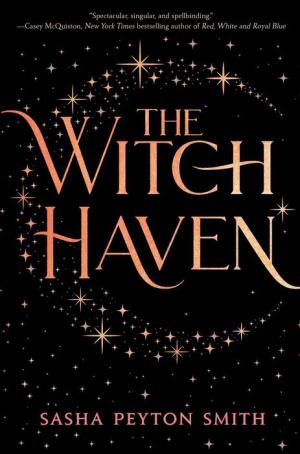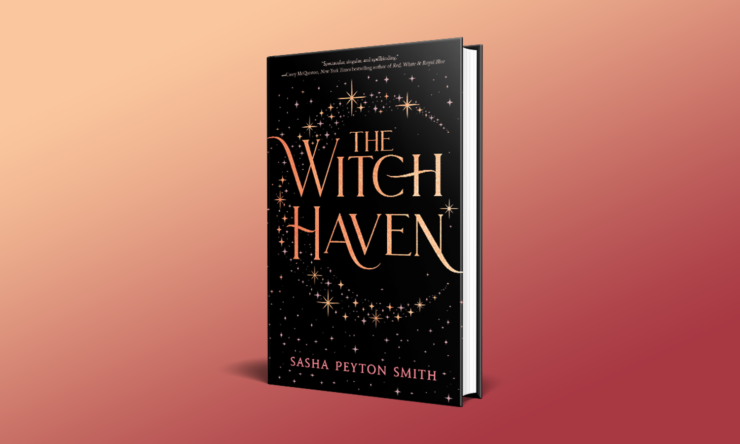At 17, Frances Hallowell is not quite an orphan. It’s 1911, her mother is locked away in a mental hospital, and she’s still actively, constantly mourning the shocking death of her brother William, murdered a year ago. Her attempts to nudge the NYPD into caring about his case come to little, and her life is a series of repetitive days working in a dress shop—until her boss, Mr. Hues, tries to force himself on her and winds up with Frances’ scissors stuck in his neck.
The weird thing is, the scissors were all the way across the shop before they stabbed him to death.
Sasha Peyton Smith’s debut YA novel The Witch Haven starts not with this pivotal moment in young Frances’ life, but with a short prologue about her brother’s death. It’s fitting, as William is a constant presence in Smith’s tale. The grief that fuels her determined quest for justice is real and heavy–and so is the magic it turns out she used to murder her lecherous boss.
But justice isn’t the only thing Frances is looking for. The morning after Mr. Hues dies, two women in nurse’s capes appear, insisting that Frances has tuberculosis and needs to be immediately whisked off to a sanitarium. As the book’s title suggests, though, Haxahaven is a place not for sick girls, but for powerful ones. It’s a school for witches—witches from all walks of life, and even from beyond New York City. At first, it’s overwhelming, but it’s not long before Frances makes friends, and realizes she wants to work magic beyond what the school allows.
The Witch Haven, once Frances gets to Haxahaven, moves at a leisurely pace. There’s so much for her, and by extension the reader, to learn: the ways of the school and classes; the social circles of the other girls, two of whom quickly become Frances’ friends and confidants; the best ways to sneak out into the woods for forbidden magic or meeting with a cute Irish lad named Finn, who may be able to help Frances find out what happened to her brother.
Buy the Book


The Witch Haven
What Frances learns, before long, is that while being a witch should offer a kind of freedom, Haxahaven may be another kind of cage. The witches learn to thread needles, to do useful, practical, household magic. For a girl who has discovered that it may be possible to raise her dead brother and ask him what happened to him, what Haxahaven offers is not enough.
It’s an intriguing change from the way so many other schools for witches and wizards have been presented; they’re usually havens from a dull or harsh reality, or the place where a character comes into their own, or at least a place of competition and danger. Frances chafes within Haxahaven’s limitations, which are partly imposed out of fear: if witches aren’t flashy and powerful, then they can’t draw attention to themselves, and can fly safely under the world’s radar. But Frances, once she learns there’s more to want, grows ambitious. Part of that ambition is tied to her need to know what happened to William, but but some of it is innate to Frances. In a way, it’s practical: she has a talent, and she wants to use it. Who wouldn’t?
The Witch Haven’s first-person voice is all Frances, with the narrow focus that entails. This is extremely effective for keeping her relatively naive; for all she thinks she’s learning, there’s so much about New York—its conflicts, its magical denizens, its power structures—that she just doesn’t know. She knows what drives her, but can’t necessarily recognize the same desires in others.
The limited perspective serves a clear narrative purpose, but it’s hard not to want to see more of Smith’s world, and more of Frances’ two friends on their own terms. Maxine has a rich family that she keeps quiet about, though it’s not her only secret. She’s a Finder, and because her magic can tell when girls awaken to their magic, she’s valuable to Haxahaven and has certain privileges. Lena, one of Frances’ roommates, came to Haxahaven from a residential school, and has a fraught relationship with the witch school and its power over her. Each of the girls moves through the world in a markedly different way that contrasts with Frances’ drive and obsession: Maxine forcefully extroverted, Lena wary and considering. But at times it can feel like their personal histories exist more to educate Frances than to illuminate their characters.
Frances’ attraction to the charming Finn is delicately constructed; she’s impulsive and yet constantly checks herself, unwilling to let her heart get in the way of her question for justice. A love triangle comes into focus as the book shifts toward its climax, and it feels a bit wedged in—but this may be simply because Finn, who gets so much more time on the page, is more fleshed out and intriguing than kind, rich Oliver, who is clearly the wiser choice and therefore not the interesting one. Also, he doesn’t have magic.
As The Witch Haven picks up the pace on the way to a bloody and dramatic finale, Smith builds out an intriguingly magical version of New York, with the witches in their walled Queens school, and the wizards downtown in their private club, with its magical fight club and powerful influence. The stories that Frances hears about witches who’ve left the coven tease a world of conflict and freedom, and the reality of the wizards is that they hold as much sway as any non-magical club of powerful, wealthy men would in the mundane world. And even a seemingly penniless boy in that world has more power than a witch does in hers.
At its best, the novel takes a nuanced view on the relationships among women: some are a source of strength and succor, but there’s a quiet yet insistent message in here about how institutions of all kinds can fail you, even when run by people you want to trust. The satisfying ending is clearly not the end of the story; presumably a sequel will address what happens with Frances’ power—and the fate of Haxahaven.
The Witch Haven is available from Simon & Schuster Books for Young Readers.
Molly Templeton lives and writes in Oregon, and spends as much time as possible in the woods. Sometimes she talks about books on Twitter.










